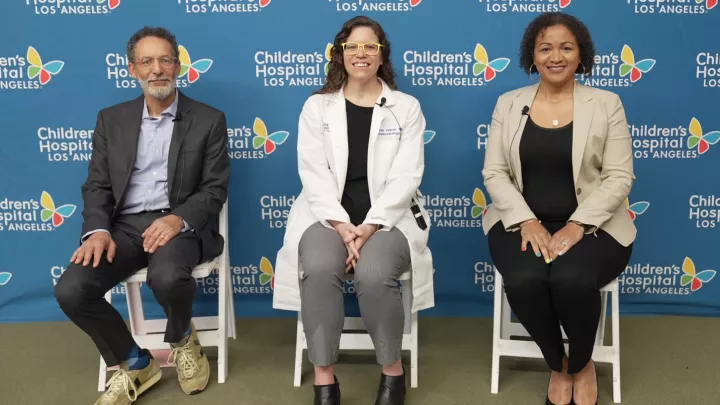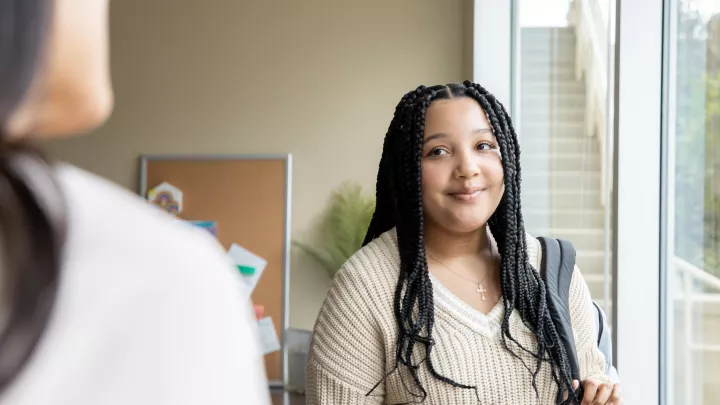
To Reduce Health Disparities, the Southern California Center for Latino Health Focuses on Children and Families
The roots of chronic diseases can start surprisingly early in life, especially for certain populations who may experience limited access to healthy food and medical care. Latinos living in Southern California have a disproportionately high risk of heart disease, nonalcoholic fatty liver disease, obesity and Type 2 diabetes, compared with other Californians. These chronic diseases, linked to social and economic disparities, are rooted in childhood.
An ambitious consortium led by investigator Michael I. Goran, PhD, aims to prevent the development of chronic diseases in Latino adults by addressing health disparities in families and young children. The economic and social stakes are high for Southern California, where 10.8 million Latinos represent 45.2% of the population.

To help children grow up in healthier communities, Children’s Hospital Los Angeles launched the Southern California Center for Latino Health in 2021 with a $24.5 million award from the National Institute on Minority Health and Health Disparities (NIMHD). The Center, which is a partnership with the Keck School of Medicine of USC as well as other universities, hospitals and dozens of community groups across the region, is one of 11 NIMHD regional centers funded by a Congressional mandate to address health disparities in chronic diseases in different populations across the nation. Lourdes Baezconde-Garbanati, PhD, MPH, Professor of Preventive Medicine at the Keck School of Medicine of USC and an expert in community engagement, is Co-Investigator and Associate Director of the Center.
The Center investigates how chronic disease disparities develop in Latinos across their lives and seeks to create and evaluate culturally sensitive, evidence-based solutions that families can use in their communities to create healthier lives for their children.
“We are studying the impact of social determinants of disease—how a combination of social, environmental and nutritional factors in early life, such as lack of access to healthy food, affects Latinos in Southern California,” says Dr. Goran, Program Director for Nutrition and Obesity at The Saban Research Institute of CHLA and Principal Investigator of the grant.
Studying the impacts of interconnected exposures
To provide parents and community groups with effective research-based tools and education so they can help their children grow up healthier, the Center has started by sponsoring three clinical studies in Latino children and families: a longitudinal study on impacts of early life factors on young children, a study on telehealth parent-based treatment and a study that prescribes food as medicine to families.
Early life factors
A longitudinal study based at CHLA, “Early Life Social, Environmental and Nutritional Determinants of Disease” (EL SENDERO), tracks nutrition in early life, environmental factors such as air pollution, and social determinants such as cultural assimilation as well as access to health care and healthy foods. The goal is to measure how these factors affect risk markers for development of chronic diseases like obesity, Type 2 diabetes, fatty liver disease and heart disease in early life.
“From a residential address history, we can determine things like air pollution or green space exposure or healthy food access,” says Dr. Goran, Director of the Center.
The Center’s researchers are scrutinizing the impact that early life nutrition, such as breastfeeding or different types of infant formula, has on risks for chronic disease. “We already know that early weight trajectory—how rapidly an infant gains weight in the first six months of life—is an important marker for the later development of chronic diseases,” says Dr. Goran. “We will look at how those early life measures relate to current disease risk at 6 years of age.”
He notes that previous studies had found distinct changes in the microbiome—the bacteria that live in the gut—of children who were fed formula that was high in milk sugars, compared with children who received breast milk. These changes, detectable as early as 6 to 12 months of age, can signal an increased risk for obesity or chronic disease.
Parent-based Treatment
The second study, led by Kerri Boutelle, PhD, and a team of researchers from the University of California, San Diego, will investigate the effectiveness of telehealth parent-based treatment in helping both parents and kids lose weight and lower their risk for chronic diseases associated with obesity, including Type 2 diabetes, liver disease and heart disease. The study will include 160 Latino families. Family members will be randomized into either six months of telehealth parent-based treatment or a control group that receives health education without the telehealth component. Both groups will be followed for 12 months.
Food as Medicine
The third study in the Center is led by Deborah Cohen, MD, MPH, at Kaiser Permanente Research, and will be a randomized trial to test food as medicine to tackle obesity and chronic disease risk. The study prescribes six months of medically curated food, culturally sensitive meal planning and affordable grocery delivery for 180 Latino Kaiser Permanente member families, with 12 months of follow-up.
The food prescriptions will be designed to cost under $680 per month—the CalFresh (California’s Supplemental Nutrition Assistance Program) budget for a family of four. Each family is expected to contribute $100 per week to their food budget, with the amount above this subsidized. “At least from the pilot studies, we’re seeing big improvements in the overall quality of food these families eat and a reduction in body weight in both men and women who are participating,” says Dr. Goran.
Engaging the community
As the Center covers communities sprawling from Ventura County to the Mexican border, Michele Kipke, PhD, in the Department of Pediatrics at CHLA, and Dr. Baezconde-Garbanati at USC are leading a community engagement core that will build a regional coalition of academic institutions, health care providers, community leaders and organizations, policymakers and public health departments.
“These are big problems, and we really want to engage a whole range of stakeholders in thinking through strategies that might help us move the dial,” says Dr. Kipke, who is also Associate Vice President for Strategic Health Initiatives at USC. “I think the most important partner in all this is the community itself.”
For several months, the team has been running a series of “listening sessions” in different communities—hearing concerns about unhealthy food in schools, or that people don’t know how to cook healthy food for their families.
Dr. Kipke is strategizing how to work with school districts to serve healthier lunches and partnering with a network of 4,000 Spanish-speaking health workers, known as promotoras, to run popular online workshops on healthy meal preparation. Responding to community requests, Dr. Kipke’s team led seminars about the research process, after which attendees expressed interest in participating in clinical studies. “You’re exposing someone to new information, and if you can offer little bite-size suggestions with the right person delivering it, suddenly you can really turn a lot of things around,” says Dr. Kipke.
Drawing on CHLA research expertise
The Center draws on the collective expertise and community ties of multiple CHLA researchers. Rohit Kohli, MBBS, MS, Chief of the Division of Gastroenterology, Hepatology and Nutrition, and Associates Chair in Liver and Intestinal Research, is a co-investigator on the EL SENDERO study with Alaina Vidmar, MD, a pediatric endocrinologist and obesity specialist at CHLA. The two are researching conditions such as nonalcoholic fatty liver disease, which is now appearing at alarming rates in Latino children with obesity.
The Center also includes an investigator development core that grants up to $400,000 in annual awards across the region to fund promising projects and train young investigators. Dr. Vidmar is the recipient of one of these awards. She is conducting a study of the effect of meal timing on the blood sugar of Latino adolescents with obesity.
Data researchers including Ramon Durazo-Arvizu, PhD, Faculty Director, Biostatistics and Data Analysis Core at The Saban Research Institute, and Mahsa Babaei, PhD, Postdoctoral Research Fellow, will manage the massive amounts of information that will be generated by the different studies.
“This is a big interdisciplinary team effort,” says Dr. Goran. “We want to know how these interventions might work effectively in different populations. But accomplishing this means working with the community to make sure we are doing research that’s relevant and developing interventions that are culturally tailored and appropriate for Latinos in Southern California.”


